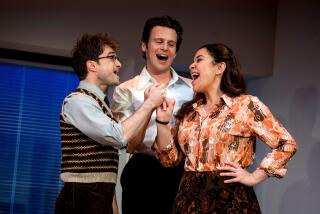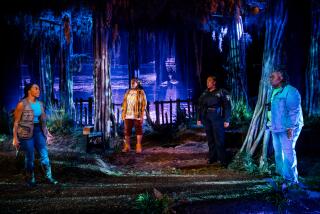‘Mary’s Wedding’ at the Colony Theatre
Some Canadian exports get damaged in transit. “Mary’s Wedding,” at the Colony, is one such example.
The original condition of the product was not tiptop in the first place. Indeed, Canadian playwright Stephen Massicotte’s highly sentimentalized drama, set during and directly after World War I, flip-flops between poeticism and mawkishness. But instead of giving his syrupy material the bracing astringency it requires, director David Rose layers on more goo.
The action is set, alternately and simultaneously, on a Canadian prairie and a European battlefield, a geographical disconnect well served by David Potts’ odd but functional scenic design, which consists of a modest clump of gently pitched, grass-covered platforms. A large, steel-gray structure, a sort of Deborah Butterfield-esque sculpture reminiscent of a horse, breaks up the grassland flatness.
What unfolds transpires in a dream on the eve of Mary’s wedding. As lightning flashes and thunder rolls, courtesy of Jeremy Pivnick’s lighting and Cricket S. Myers’ sound design, we witness the initial meeting, subsequent romance and agonized separation between Mary (Ashley Bell), a well-bred, moneyed English lass who has recently moved to Canada with her parents, and Charlie (Brett Ryback), a strapping Canadian “colonist.” Despite her snobbish mother’s disapproval of this “dirty farmer” boy, Mary falls hard for Charlie, but their love match is interrupted by the outbreak of war in Europe.
In best Harlequin romance fashion, Mary, inexplicably clad in a clingy nightgown, meets Charlie during a raging thunderstorm. To calm Charlie, who is terrified of the loud thunder (a bit of foreshadowing there), Mary helps him recite snippets from Tennyson’s “Charge of the Light Brigade” (more foreshadowing, of the most painfully obvious ilk). In short order, the two are galloping over the plains on that horse, bonding together as one -- right up until Charlie ships out to “do his share” against the Kaiser. He winds up serving under Canadian officer Lt. Gordon Muriel Flowerdew, taking part in Flowerdew’s legendary final charge at Moreuil Wood in France.
Massicotte’s drama is so unabashedly flowery it seems a bit of a throwback, but there’s a sweetness and sincerity to his language that often ameliorates the general schmaltziness. More important, his play packs plenty of intrinsic historical interest, although the two-person format, which requires Mary to do double duty as Flowerdew, is especially problematic. Watching fluffy, feminine Mary “transform” into Flowerdew seems the stuff of travesty -- a bit like watching Shirley Temple on steroids. Perhaps the play’s setting within a dream is meant to justify exactly such an implausibility. Still, the dubious decision not to have a third actor play Flowerdew undermines the authenticity of the battle scenes -- a shame, since they are the best written in the play.
Bell has the look and poise that should make her an ideal Mary. Unfortunately, under Rose’s direction, she badly overreaches in a histrionic performance of cloying artifice. We quickly tire of her posturing and cannot understand why Ryback’s refreshingly matter-of-fact Charlie does not also. That’s a shame, because Rose could so easily have diverted Bell into another channel, a missed detour that leaves this dreamscape “Wedding” floundering short of catharsis.
Foley is a freelance writer.
More to Read
The biggest entertainment stories
Get our big stories about Hollywood, film, television, music, arts, culture and more right in your inbox as soon as they publish.
You may occasionally receive promotional content from the Los Angeles Times.






